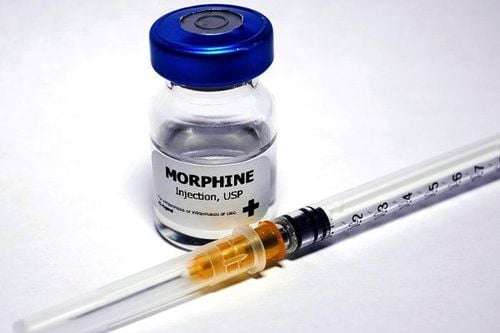This is an automatically translated article.
Thrush is an infection of the oral cavity caused by the fungus Candida albicans. The disease is usually limited to infants, patients taking antibiotics or steroids, polyendocrine disorders, or underlying immune dysfunction. So what is thrush in people with head and neck cancer? The following article will help you better understand this situation?
1. What is thrush?
Thrush is caused by a yeast infection. It is caused by an overgrowth of a fungus called Candida.
For infants and young children, the body's immune system is still weak, Candida Albicans fungus will develop, leading to milky white patches on the lining of the baby's tongue, inside cheeks and on the roof of the baby's throat. This condition will occur in about 2-5% of healthy babies.
Thrush can affect:
Tongue; Oral mucosa; Throat; The lining of the esophagus (the tube that connects the throat to the stomach). Thrush is also known as "oral candidiasis," "oral candidiasis," "oropharyngeal candidiasis," or if it affects the lining of the esophagus.
2. What will the symptoms of oral thrush look like?
General manifestations:
Milky white patches like cheese, patchy on the surface of the tongue, inside of the cheeks, gums and roof of the mouth. These patches may be raised, red, or may bleed. For infants and young children:
These patches may not cause pain, but there are cases where they cause pain, making the child irritable, uncomfortable, or fussy. Children also become anorexic, or salivate because of pain. For older children and adults:
Feeling of having cotton balls in the mouth. Swallowing pain, difficulty eating. Loss of taste. Babies can also get oral thrush from their mother's nipples and common breast fungal symptoms will be:
The nipples are also unusually red, cracked or itchy; Peeling or peeling on the darker part and circular area around the nipple (nipple); Unusual pain during breastfeeding or sore nipples between feedings; Feeling of a sharp pain deep inside the breast
3. What causes thrush?
Normally, your body can keep fungi and bacteria at safe levels. However, sometimes the fungus that causes thrush can grow out of control. You may be at risk for oral thrush if:
You have a weak immune system. You are taking steroids, antibiotics or are taking birth control pills. You are being treated for head and neck cancer. Radiation therapy and chemotherapy both increase the risk of thrush. Certain types of cancer such as leukemia, lymphoma, and multiple myeloma are at increased risk for thrush. You are undergoing or have received a stem cell transplant for head and neck cancer treatment. You have diabetes.
4. How to diagnose thrush?
Usually, your doctor can diagnose thrush just by looking inside your mouth. If your doctor thinks you have thrush and esophagitis, he or she may swab your throat to take a culture and look at it under a microscope. An X-ray of your esophagus may be done. An endoscopy may be performed (a thin tube with a lighted camera on the end that looks down the esophagus into the stomach and small intestine).
5. How can thrush in people with head and neck cancer be prevented?
If you are receiving certain treatments for head and neck cancer or are having a stem cell transplant, your doctor may give you antifungal medication before, during and after to prevent certain infections, such as such as thrush.
In addition, you should also take the following measures to prevent oral diseases when you have cancer:
Keep your mouth and teeth clean. Brush your teeth with a soft-bristled toothbrush, do not floss. Do not use mouthwash or alcohol-based sprays. Talk to your care professional about which ones are safe to use. Visit your dentist regularly. Tell them if you are being treated for head and neck cancer. Limit the amount of sugar and yeast you eat or drink. Bread, beer and wine can increase the risk of thrush. If you smoke, quit. If you use an inhaler, rinse your mouth thoroughly after each use. In short, if you are experiencing dental problems during treatment for head and neck cancer, you should inform your treating doctor for appropriate treatment. Besides, you should also maintain good oral hygiene, follow a reasonable diet and activities to increase the body's immunity.
Please dial HOTLINE for more information or register for an appointment HERE. Download MyVinmec app to make appointments faster and to manage your bookings easily.
References: oncolink.org, emedicine.medscape.com













